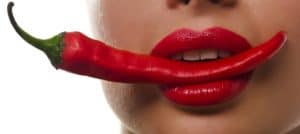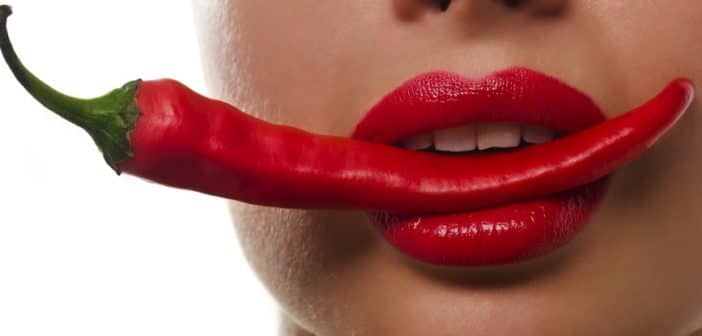 America’s love affair with spicy foods isn’t just wildly out of control. According to a study by South Korea’s Busan National University, the obsession could be downright dangerous for alcoholics. It reminds me of the scene in This is Spinal Tap where lead guitarist Nigel Tufnel (Christopher Guest) is proudly showing off a very special amplifier, boasting that its volume “goes to 11.” When he’s asked why the amp is one louder than 10, he shrugs: “Well, it’s one louder, isn’t it?” It’s such a plain-faced response that you can’t help but agree with his daft logic. This says everything about America’s infatuation with sweat-inducing food right now. On virtually every restaurant menu, there’s an option for people with cast-iron stomachs: ghost-pepper fries, habanero sauce, Sriracha ketchup. There’s even cayenne ice cream out there. But if you’re constantly chasing down an “11” in the flavor department, you could also be prone to alcoholism. The South Korean study shows a direct connection between booze and spicy food —a combustible combination that reveals much about alcoholism and how the human brain works.
America’s love affair with spicy foods isn’t just wildly out of control. According to a study by South Korea’s Busan National University, the obsession could be downright dangerous for alcoholics. It reminds me of the scene in This is Spinal Tap where lead guitarist Nigel Tufnel (Christopher Guest) is proudly showing off a very special amplifier, boasting that its volume “goes to 11.” When he’s asked why the amp is one louder than 10, he shrugs: “Well, it’s one louder, isn’t it?” It’s such a plain-faced response that you can’t help but agree with his daft logic. This says everything about America’s infatuation with sweat-inducing food right now. On virtually every restaurant menu, there’s an option for people with cast-iron stomachs: ghost-pepper fries, habanero sauce, Sriracha ketchup. There’s even cayenne ice cream out there. But if you’re constantly chasing down an “11” in the flavor department, you could also be prone to alcoholism. The South Korean study shows a direct connection between booze and spicy food —a combustible combination that reveals much about alcoholism and how the human brain works.
The Heat Is On
Variety isn’t just the spice of life anymore. It’s clear that America is seeking variety in its spices, too. Fiery foods are tops when it comes to what we’re ordering these days: “I can’t overstate the importance of spicy and hot as a menu trend,” one food researcher said in a recent Restaurant Business Online article. If that’s the case, the Busan National University study could spell trouble for lots of alcoholics out there. Researchers found that alcohol and spicy food affect the brain’s reward and pleasure centers in the exact same way. “If spicy food is your guilty pleasure, then you’re more susceptible to having unhealthy drinking habits,” Yahoo Lifestyle said. Independently, alcohol and spicy foods release a flood of endorphins (pleasure chemicals) in the brain. Together, they’re a perfect storm that could do more than just damage your taste buds.
Feeling The Burn
From a very early age, I loved spicy food. I don’t mean that I enjoyed the occasional pickled jalapeno. No, I was into anything that made adults shake their head in disbelief that I was consuming it. And to be honest, I wasn’t eating raw cherry peppers on a dare or to impress anyone. I just did it. I honestly loved the sheen of sweat; I genuinely looked forward to my heart beating a little faster. Looking back, though, my relationship with spicy food isn’t any different than my old love affair with, say, beers at Buffalo Wild Wings or a chilled bottle of Jagermeister. I’m still powerless whenever I see a cartoon red chili next to a menu item. I just can’t help myself from ordering a hot specialty. I constantly find myself seeking out the spiciest thing on the menu as if I hate feeling my tongue. In Indian restaurants, I practically dare them to prepare the hottest vindaloo they can (I recently paid the price for this one). I’ve also grown dozens of exotic-sounding peppers that were equally inedible. Still, I’m wired to chase down that burn, and nothing could be more alcoholic of me.
Much has been written about the personalities who enjoy spicy foods, too. “There’s a long-standing hypothesis that risk takers are adrenaline deficient and that they take risks to get that adrenaline and feel better,” one researcher says. “So they’ll work with bombs or in other high risk environments and then they’ll feel normal. Similarly, when you eat hot spicy food, I gives you a little bit of pain and therefore enhances your adrenaline level.” Adrenaline deficiency or not, I’m a recovering alcoholic whose brain lights up at the very thought of a habanero cheeseburger. One study examined personality traits and capsaicin (the active ingredient in spicy foods) and discovered that the people who enjoy “spicy foods exhibit higher Sensation Seeking and Sensitivity to Reward traits.” In other words, people who eat like me probably drink like I did, too.
Uncomfortably Numb
The Busan National University study revealed something else: “Medication used to treat alcohol problems is more effective in people who prefer a bit of spice in their meals.” They studied two separate groups of drinkers—one group that preferred spicy food, another group that didn’t—and provided both of them with a drug called naltrexone. Tellingly, the drug only worked on the group that preferred spicy food. The results indicated that people received the same jolt from spicy food that they received from alcohol, meaning the booze suddenly wasn’t all that important to them.
Developed in the 1960s but not used in addiction treatment until the 1980s, naltrexone is very effective at blocking the rewarding sensation of opioids. Later, the drug was used to treat alcoholism. Official government descriptions of the drug state that “when used in combination with psychosocial therapy, [naltrexone]could reduce cravings for alcohol and decrease relapse rates to alcohol use.” Still, the drug isn’t a one-size-fits-all solution. People naturally differ in how their bodies respond to opiates in all the same ways they differ in terms of their tolerance of spicy food. Some people can handle a raw habanero; some people can’t stand an extra dash of black pepper. By that same token, however, “they also get a stronger effect from the thing blocking the opiate response.” Animal tests also bear these findings out, too, where researchers injected alcoholic rats with capsaicin: “After those injections, the rats showed a decreased interest in consuming alcohol.” Alone, the spice did the trick.
What’s most fascinating about studies like this is what it says about the brain. The reward center seems extremely susceptible—if not altogether fragile. It doesn’t take a lot to overpower it. With the rewards of spicy food and alcohol traveling the same routes in the brain, it’s almost frightening to think just how parallel the two are. Seeking pleasure from pain isn’t a new concept, but it’s certainly enough to give any alcoholic a moment of pause. There’s no data (yet) that proves a night of spicy chicken wings can trigger a relapse, but it’s intriguing that alcoholics might not even understand that they’re chasing an alcoholic high through spicy food. In fact, alcohol is exactly like the spiciest thing on the menu: it may sound appealing at first, but it’ll eventually take on a life of its own—until you can’t taste or feel anything at all.
Sponsored DISCLAIMER: This is a paid advertisement for California Behavioral Health, LLC, a CA licensed substance abuse treatment provider and not a service provided by The Fix. Calls to this number are answered by CBH, free and without obligation to the consumer. No one who answers the call receives a fee based upon the consumer’s choice to enter treatment. For additional info on other treatment providers and options visit www.samhsa.gov.




